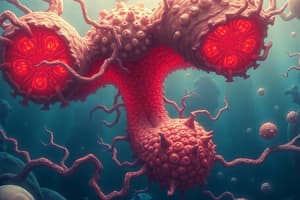Podcast
Questions and Answers
Which nitrogenous waste product is primarily excreted by aquatic animals due to its high toxicity?
Which nitrogenous waste product is primarily excreted by aquatic animals due to its high toxicity?
- Ammonia (correct)
- Uric acid
- Creatinine
- Urea
What is the primary role of aldosterone in the excretory system?
What is the primary role of aldosterone in the excretory system?
- To enhance sodium and potassium reabsorption (correct)
- To increase water reabsorption
- To regulate glucose levels in urine
- To stimulate urine production
Which of the following excretory systems uses a network of tubules to filter waste in flatworms?
Which of the following excretory systems uses a network of tubules to filter waste in flatworms?
- Malpighian tubules
- Kidneys
- Protonephridia (correct)
- Metanephridia
What is the process of adding waste products into the filtrate during urine formation called?
What is the process of adding waste products into the filtrate during urine formation called?
How do desert animals adapt their excretion process to conserve water?
How do desert animals adapt their excretion process to conserve water?
What are the main components of the urinary system?
What are the main components of the urinary system?
Which hormone is primarily responsible for regulating water reabsorption in the kidneys?
Which hormone is primarily responsible for regulating water reabsorption in the kidneys?
What is the nature of uric acid compared to ammonia and urea?
What is the nature of uric acid compared to ammonia and urea?
Flashcards
What is excretion?
What is excretion?
The process by which metabolic waste products are removed from the body
What are metabolic waste products?
What are metabolic waste products?
Toxic substances produced during metabolic processes
What is ammonia?
What is ammonia?
Highly toxic nitrogenous waste produced by aquatic animals
What is urea?
What is urea?
Signup and view all the flashcards
What is uric acid?
What is uric acid?
Signup and view all the flashcards
What are kidneys?
What are kidneys?
Signup and view all the flashcards
What hormones regulate excretion?
What hormones regulate excretion?
Signup and view all the flashcards
How do organisms adapt to different environments for excretion?
How do organisms adapt to different environments for excretion?
Signup and view all the flashcards
Study Notes
Excretion in Animals
- Excretion is the process of removing metabolic waste products from the body.
- These waste products can be toxic if allowed to accumulate.
- Different organisms have different excretory systems adapted to their environment and lifestyle.
- The primary nitrogenous waste products include ammonia, urea, and uric acid.
- Ammonia is highly toxic and requires large amounts of water for excretion. It is common in aquatic animals.
- Urea is less toxic than ammonia and requires less water for excretion. It is common in mammals and some amphibians.
- Uric acid is the least toxic and requires the least amount of water for excretion. It is a common form of waste in birds and reptiles.
Types of Excretory Systems
- Different animals exhibit various excretory systems, including protonephridia, metanephridia, and Malpighian tubules.
- Protonephridia are simple networks of tubules found in flatworms and other invertebrates.
- Metanephridia are more complex tubules found in some annelids and mollusks.
- Malpighian tubules are excretory organs found in insects and other arthropods. These tubules filter waste from the hemolymph.
Kidneys
- The kidneys are the main excretory organs in vertebrates.
- They perform the vital function of filtering blood and removing waste products.
- The process of urine formation involves three main steps: filtration, reabsorption, and secretion.
- Filtration occurs in the glomerulus, a network of capillaries in the Bowman's capsule.
- Reabsorption involves the return of essential substances (water, glucose, amino acids) from the filtrate back into the bloodstream.
- Secretion involves the addition of waste products into the filtrate.
Urinary System Components
- The urinary system consists of the kidneys, ureters, bladder, and urethra.
- The ureters transport urine from the kidneys to the urinary bladder.
- The urinary bladder stores urine until it is eliminated from the body.
- The urethra is the tube through which urine is expelled.
Hormonal Regulation of Excretion
- Hormones play a critical role in regulating the function of the excretory system, particularly the kidneys.
- Antidiuretic hormone (ADH) regulates water reabsorption in the kidneys.
- Aldosterone regulates sodium and potassium reabsorption, impacting water balance.
Adaptations to Environments
- Organisms in different environments exhibit adaptations to excretion.
- Desert animals have adaptations to conserve water, such as producing concentrated urine.
- Aquatic animals, in contrast, tend to excrete dilute urine.
- These adaptations reflect the interplay between water balance and waste removal.
Importance of Excretion
- Excretion is vital for maintaining homeostasis in the body.
- By removing waste products, it prevents the buildup of toxins.
- This maintenance of a stable internal environment is essential for proper cellular functioning and overall health.
- Maintaining osmolarity, acidity, and nitrogenous waste concentrations are all directly affected by the excretory system.
Studying That Suits You
Use AI to generate personalized quizzes and flashcards to suit your learning preferences.




